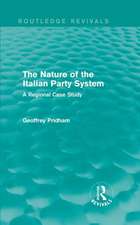The Justice and Development Party in Turkey: Populism, Personalism, Organization
Autor Toygar Sinan Baykanen Limba Engleză Paperback – 17 iun 2020
| Toate formatele și edițiile | Preț | Express |
|---|---|---|
| Paperback (1) | 287.87 lei 6-8 săpt. | |
| Cambridge University Press – 17 iun 2020 | 287.87 lei 6-8 săpt. | |
| Hardback (1) | 696.80 lei 3-5 săpt. | |
| Cambridge University Press – 5 dec 2018 | 696.80 lei 3-5 săpt. |
Preț: 287.87 lei
Nou
Puncte Express: 432
Preț estimativ în valută:
55.08€ • 57.40$ • 45.61£
55.08€ • 57.40$ • 45.61£
Carte tipărită la comandă
Livrare economică 03-17 aprilie
Preluare comenzi: 021 569.72.76
Specificații
ISBN-13: 9781108461658
ISBN-10: 1108461654
Pagini: 336
Ilustrații: 8 b/w illus. 3 maps
Dimensiuni: 153 x 230 x 20 mm
Greutate: 0.45 kg
Editura: Cambridge University Press
Colecția Cambridge University Press
Locul publicării:Cambridge, United Kingdom
ISBN-10: 1108461654
Pagini: 336
Ilustrații: 8 b/w illus. 3 maps
Dimensiuni: 153 x 230 x 20 mm
Greutate: 0.45 kg
Editura: Cambridge University Press
Colecția Cambridge University Press
Locul publicării:Cambridge, United Kingdom
Cuprins
Acknowledgements; 1. Introduction: agency matters; 2. The transformation of the Turkish party system: selective pluralism and the rise of the JDP; 3. The high-low divide in Turkish politics and the populist appeal of the JDP; 4. The JDP and Erdoğan: non-charismatic personalism; 5. The JDP strategies: moving beyond the basics of Turkish party politics; 6. The JDP organization: a personalistic mass party; 7. Elite recruitment in the JDP: 'you do not want these kinds of people in the parliament'; 8. 'The new regime': the role of agency in the rise of competitive authoritarianism in Turkey; 9. Conclusions: findings, implications, future research; Appendix 1. Brief information on the political parties in Turkey; Appendix 2. The high-low (or anti-populism/populism) and left-right divides in Turkey.
Recenzii
'This ground-breaking book, based on new research and drawing on comparative scholarship, provides a fascinating insight into the very heart of the Justice and Development Party and so into the heart of contemporary Turkish politics.' Paul Taggart, University of Sussex
'Baykan brings together a sophisticated theoretical focus, exhaustive research and lucid analysis to study the transformation of the Justice and Development Party from a religious-conservative democratic party into a 'personalistic mass party.' Not only students of Turkish but also those of comparative political parties and leadership will find it fascinating reading that will enhance their own analyses.' İlter Turan, İstanbul Bilgi University
'How and why did an Islamist (and later post-Islamist) party embraced populism? How did a populist party defy expectations that populist are destined to fail in government? In explaining the Justice and Development Party's electoral success and political resilience by the robust organisational leverage of a party firmly controlled by the leadership and by Erdogan's ability to reach economically and culturally underprivileged segments of society through 'low populist' appeals, Barkyan presents a compelling analysis of the political success of the JDP in Turkey and makes and important contribution to contemporary debates on competitive authoritarianism and on populism.' Francisco Panizza, London School of Economic and Political Science
'Baykan's Justice and Development Party in Turkey is fascinating and shrewd. It provides an incisive, comprehensive, and convincing analysis of the rise of the party and, more importantly, its leader Erdogan to the extremely powerful executive position in Turkish politics. His work is original, unfailingly eloquent, instructive, timely and inspiring. In a time when we have been observing the rise of competitive authoritarianism and democratic backsliding on a global scale, Baykan's work will exert great influence for the academic and policy-oriented studies and discussions, not only in the Turkish context but also in the fields of Political Science, Comparative Politics and Political Theory. It is a must-read.' Fuat Keyman, Sabancı University
'Baykan brings together a sophisticated theoretical focus, exhaustive research and lucid analysis to study the transformation of the Justice and Development Party from a religious-conservative democratic party into a 'personalistic mass party.' Not only students of Turkish but also those of comparative political parties and leadership will find it fascinating reading that will enhance their own analyses.' İlter Turan, İstanbul Bilgi University
'How and why did an Islamist (and later post-Islamist) party embraced populism? How did a populist party defy expectations that populist are destined to fail in government? In explaining the Justice and Development Party's electoral success and political resilience by the robust organisational leverage of a party firmly controlled by the leadership and by Erdogan's ability to reach economically and culturally underprivileged segments of society through 'low populist' appeals, Barkyan presents a compelling analysis of the political success of the JDP in Turkey and makes and important contribution to contemporary debates on competitive authoritarianism and on populism.' Francisco Panizza, London School of Economic and Political Science
'Baykan's Justice and Development Party in Turkey is fascinating and shrewd. It provides an incisive, comprehensive, and convincing analysis of the rise of the party and, more importantly, its leader Erdogan to the extremely powerful executive position in Turkish politics. His work is original, unfailingly eloquent, instructive, timely and inspiring. In a time when we have been observing the rise of competitive authoritarianism and democratic backsliding on a global scale, Baykan's work will exert great influence for the academic and policy-oriented studies and discussions, not only in the Turkish context but also in the fields of Political Science, Comparative Politics and Political Theory. It is a must-read.' Fuat Keyman, Sabancı University
Notă biografică
Descriere
A fieldwork-based account of the role of populism, personalism and organisation in the rise of Erdoğan's JDP to authoritarian predominance.
























